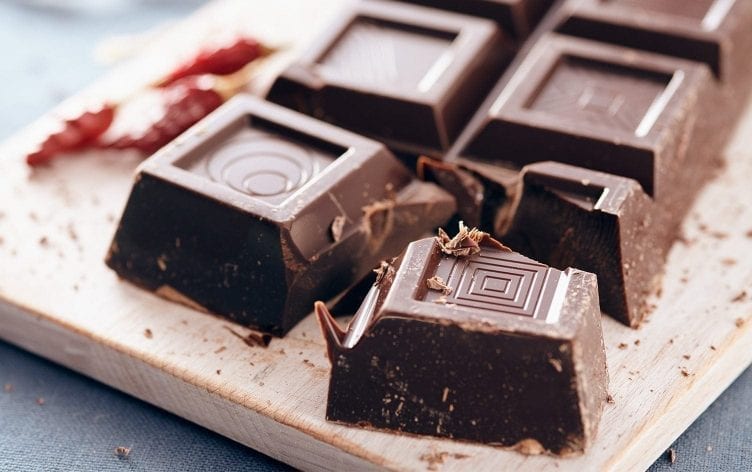
For many athletes, knowing which foods aid performance and which don’t relies on trial and error. Peer-reviewed journals can be a great source of information, too. They provide top-tier, quality content backed by thorough investigation from researchers on numerous subject groups. The following foods received such examination and the results were published in top journals. Read on to learn more about each study and outcome, then decide for yourself whether or not it works for your training.
1. DARK CHOCOLATE
Background: The flavanols in dark chocolate can help boost nitric oxide production — this causes blood vessels to swell and reduces the amount of oxygen you need.
Question: Does dark chocolate consumption lower oxygen requirements and allow you to exercise longer?
The research: In a study published in the Journal of the International Society of Sports Nutrition, a team of researchers at Kingston University reviewed this query. They had a group of nine amateur cyclists complete an initial fitness test to establish where their exercise levels were. The nine participants were split into two groups. The first group replaced one of their daily snacks with 40 grams of dark chocolate daily for two weeks. The second group did the same, but replaced the snack with white chocolate. During this period, researchers conducted cycling tests and tracked heart rates and oxygen consumption. After a seven-day break to remove all traces of chocolate from their bodies, the two groups switched the type of chocolate they ate for an additional two weeks and took the same cycling tests again.
Conclusion: Dark chocolate eaters used less oxygen when cycling at a moderate pace, and covered more distance in a two-minute time trial.
2. BEETROOT
Background: Eating nitrates has been linked to exercise improvement; roasted beets contain particularly high nitrates.
Question: Can the nitrates found in beets improve running performance?
The research: In a study published in the Journal of the Academy of Nutrition and Dietetics, researchers used 11 recreationally fit men and women in a double-blind trial to discover the answer. Participants ate baked beetroot and 75 minutes later ran a 5K treadmill time trial. In a separate test, they ate cranberry relish and 75 minutes later ran the same 5K time trial.
Answer: After eating beets, participants ran 5% faster and perceived exertion was lower than after eating cranberry relish.
3. CHERRY JUICE
Background: Cherries are known for their anti-inflammatory properties.
Question: Can these anti-inflammatory properties translate into helping runners recover after a marathon?
The research: Published in the Scandinavian Journal of Medicine & Science in Sports, researchers tested marathon runners to see if cherry juice works. Twenty recreational marathon runners were assigned to one of two groups: cherry juice drinkers or placebo drinkers. They consumed their drink for five days before a marathon, the day of the race and 48 hours after. Muscle damage, soreness and inflammation were examined before and after the race.
Conclusion: Those who drank cherry juice healed faster. Researchers found the juice reduced inflammation by increasing total antioxidative capacity — meaning, the antioxidants in the cherries helped clean the harmful free radicals in the cells and blood. In turn, strength recovered significantly faster.



